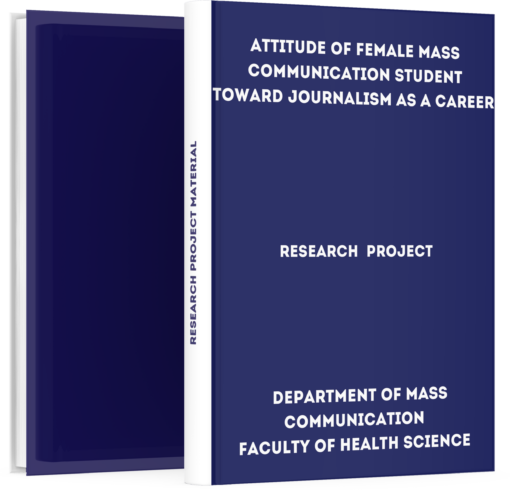Attitude of Female Mass Communication Student Toward Journalism as a Career
₦3,000.00
If you are interested in getting this project material “Attitude of Female Mass Communication Student Toward Journalism as a Career”, click on the DOWNLOAD BUTTON to make payment and the file will be delivered to your email immediately after confirmation.
Description
– Attitude of Female Mass Communication Student Toward Journalism as a Career –
Download Attitude of Female Mass Communication Student Toward Journalism as a Career. Students who are writing their projects can get this material to aid their research work.
Abstract
There is an increasing number of female journalism students in training institutions in Europe and Asia and Africa (Frohlich 2004; Creedon 1993; Kosicki & Becker 1992; Peterson 1988). However, it has been observed that there is a disproportionate number of practicing female journalists who graduate from these programmes (Jurkowitz 2003).
The number of female students graduating from journalism schools are high, but the number of those practicing in newsrooms is disproportionately lower. For example, University of Zambia (UNZA) records of graduates in the Department of Mass Communication indicate that more women than men graduate as journalists.
The author’s observations based on over twenty years of teaching journalism in the UNZA programme is that in their entry year, the female students declare that they want to be trained as journalists and to work in the newsroom. But by third and fourth year, their career direction seems to change.
They lose interest in traditional journalism reporting and begin to prefer public relations and other specializations in the communications industry. Even those who at graduation accept reporting positions in the newsrooms, pursue alternative careers within the first three years.
This phenomenon brings up a critical question: What drives females out of the newsroom? Besides the obvious matter of better salaries. It posits that additional influences on career choices are grounded in socialization, biased attitudes, cultural beliefs and are gender based.
Introduction
1.1 Background of the Study
Barriers to women’s ability to climb the cooperate ladder in the media industry, negative or gender-blind and biased attitudes in the media are varied.
They include, women’s low status in society, traditional and cultural expectations, heavy workloads, double shifts of working at home and office, and their absence in positions of formal authority or decision-making (Nyondo.,2005).
Gender bias in different institutions including media houses as observed today derives its roots from the time society begun differentiating roles between women and men. These roles were defined according to societal beliefs and customs. The customs and beliefs became the norm by adoption and compliance.
Society started to perceive men’s roles as being superior to those of women and the status of men was given a superior position therefore, this action from the male’s affect the attitude of most female mass communicators.
The superior status ensured men’s dominance in all areas of human activity with exception of maternal roles of carrying a baby for nine months and breast feeding.
The colonial governments in Africa made it worse. Females were discriminated against in the education system and society accepted it. Interviews with older women in a literacy class revealed that females who pursued any formal education were even labeled “prostitutes.”
The colonial system gave education and employment to males, therefore, men became responsible for policy formulation and drafting of rules and regulations.
In the process, their priorities did not consider women’s interests. The colonial governments, by empowering men with education and employment, automatically positioned them as the sole bread earners of the families.
The important role that a traditional woman held in the home was diminished more and more. This masculine culture reflected in society in general also penetrated institutions, media houses and other social sectors.
How to Download this Project Material
First, note that we are one of the best and most reliable online platforms because we don’t retain any of your personal information or data as regards making payments online.
PRICE: ₦3,500 ₦3,000 (Three Thousand Naira Only)
Make a bank deposit or mobile transfer of ₦2,000 only to the account given below;
Bank Name: UBA Account Number: 1022564031 Account Name: TMLT PRO SERVICES
After making the payment, CLICK HERE to send the following on WhatsApp;
- Depositor’s Name or Screenshot of Payment
- Name of the Past Question
- Active Email Address
or Call Us On +2348082284439 Once your details have been received and your payment confirmed by us, you will receive the past question in your email or WhatsApp within 5 Minutes.
Guarantee of Getting the Material
We understand that due to the high rate of fraud, many people are afraid of making purchases online but be rest assured that PastExamQuestions will deliver your material after payment.
Once your details have been received and your payment confirmed by us, you will receive the past question in your email or WhatsApp.
Give us Feedback
Have we been able to satisfy you? How well do you think the material will be helpful after having gone through it? Does the price worth the material?
Let’s hear from you! We recommend that our customers give feedback at the end of every transaction to enable us to serve better. You can do this by clicking the review button on this page.
Where is the review button? >> Just scroll up to where you see reviews





Reviews
There are no reviews yet.